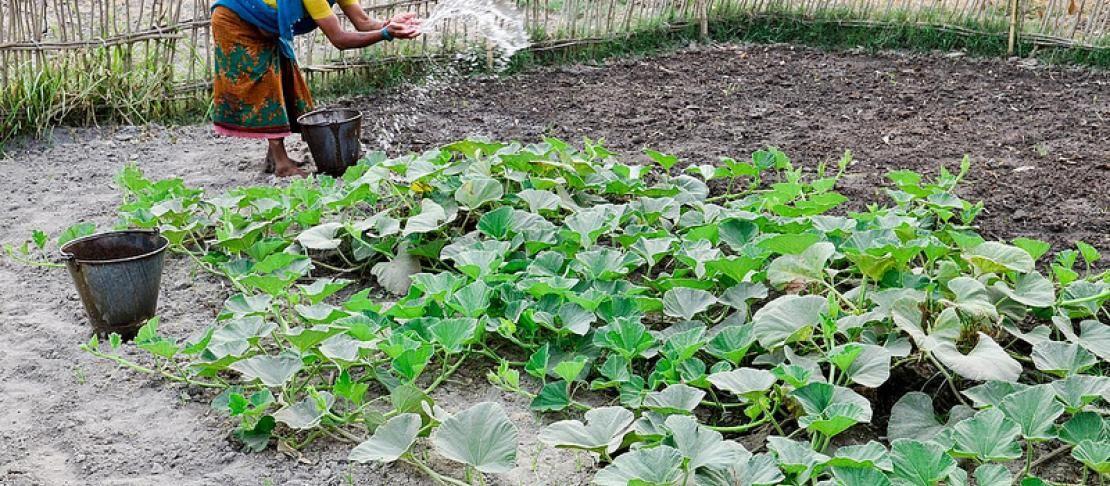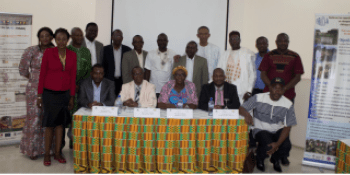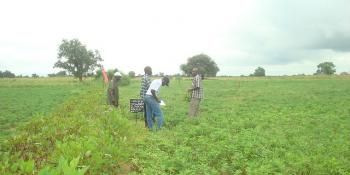Radio jingles on climate change aim to reach a million listeners in Nepal

In Nepal, droughts, floods and erratic rainfall serve a constant reminder of the vagaries of the weather. This uncertainty has forced several smallholder farmers to abandon agriculture and migrate to urban areas or overseas in search of better livelihood options. In order to make agriculture viable for farmers and encourage the adoption of climate-resilient agriculture practices, it is important that they first of all have access to information on climate change and its long-term implications on agriculture.
CCAFS South Asia program is therefore supporting the Nepal Development Research Institute (NDRI), and their work to increase awareness on climate change among farmers in Nepal. This is being done through a series of one-minute radio jingles and Public Service Announcements, and is part of a larger project between CCAFS and NDRI on Prioritisation of Adaptation Options in Agriculture and ICT based Dissemination of Climate Information.
This is a good way to disseminate information, as a pilot study on the information and communication technology needs in Rupendehi district, Western Terai Region in Nepal, where CCAFS has a research site, reveals that more than half the population prefers to get their agriculture and weather related information through the radio.
Getting farmers up-to date information on climate change, while also explaining what climate change really is about, is important. The lack of clarity about the concept of climate change became apparent during a CCAFS-led training of trainers’ workshop in Kathmandu on climate change, gender and food security, as participants said that they had heard the word ‘climate change’ but had little or no idea what it actually meant.
This is supported by data from Climate Asia from Nepal, 42 percent of the people are aware of the term climate change, while 40 percent are not aware and 15 percent are aware but don’t know what it means. The study also shows that 81 percent of the population rely on the radio for information, while 91 percent use mobile phones.

A study by Climate Asia shows that 91 percent of the population in nepal rely on mobile phones for information
(Photo Neil Palmer, IWMI)
At the start of the project, Siddhartha 98.8 FM, a popular radio station aired five of the jingles in Rupandehi district. Targeting rural farmers, the Public Service Announcements and jingles were interspersed during a regular show which is in the form of interesting conversations with the radio narrator, Laxmi Bhusal, known locally through the character Budhi Amai (old lady). Laxmi has for decades been a familiar voice on agriculture issues and farmers’ problems on the airwaves.
Jingles were aired on the science behind climate change, crop insurance and on increasing crop productivity through climate-smart technologies, among others topics.
The Agriculture Information and Communication Centre, Department of Agriculture, Nepal has worked with the NDRI to craft several more jingles that will soon be broadcast by Radio Nepal throughout the country. It is expected to reach nearly 1.3 million people during the course of the project.
Despite their busy schedules, farmers have found time to tune in to the show.
“The messages are useful and relevant to me. I have learnt a lot about climate change and would like to practice some the interventions that they have been talking about,” says Tej Lal Dumre, a farmers’ cooperative leader in Kerwani in Rupendehi.
T.P. Bhusal, station manager of Siddhartha FM commented during an interview that:
“It is lovely to hear the messages through the voice of Budhi Aamai. The show is important in the current scenario of climate change and its impact on agriculture. Farmers face a lot of uncertainty but access to the right information can benefit them greatly.”
Bridging the information gap on climate change among farmers, as well as between farmers and researchers, is a critical step to help farmers practice climate-smart agriculture. With better awareness about the problem at hand, farmers are more likely to adapt their agricultural practices to a changing climate rather than abandon farming for other occupations.
Further Reading:
State of agricultural climate change adaptation policy in Nepal
Current status of agrometeorological services in South Asia, with special emphasis on the Indo-Gangetic Plains
Snehalata Sainjoo, Jaya Gurung and Punya Regmi all work for Nepal Development Research Institute (NDRI), a key partner to CCAFS South Asia.



